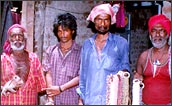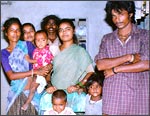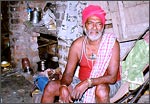Everyday, little Venkatesh, a student of class III, picks up pieces of newspaper from what his community collects from various garbage bins, and reads the news aloud to the illiterate members of his community. All of them crowd around him, listen to him in rapt attention, awe and admiration. He is a true hero to all the others in the community, a role model for the old and the young alike.
 "I don't want my children to become like me. They should grow to be like Venkatesh. I want them to be civilised," Vaidyagiri, a member of Venkatesh's community says.
"I don't want my children to become like me. They should grow to be like Venkatesh. I want them to be civilised," Vaidyagiri, a member of Venkatesh's community says.

Venkatesh and Vaidyagiri are just two members of the gypsy clan, nomadic tribes who are better known as narikkuravas in Tamil Nadu. Uncouth and unkempt, narikkuravas are shunned, despised and snubbed by society at large. They are treated like criminals.
Not surprising, these people, most of whom are ragpickers, have no home. They have no proper job. They are unclean and bathe only once a week. They defecate in the open. They do not cut their hair as they believe it is a bad omen to do so. They certainly cannot read or write as no one from their community has ever been anywhere near a school.
Today, however, things are a little different. The narikkuravas have shed their superstitions and with it, their uncouth lifestyle. And there are quite a few aspiring Venkateshes and Vaidyagiris among them. All this is thanks to the efforts of a former police officer, S Satyanarayanan. Along with a lot of grit, determination and dedication, it took Satyanarayanan eight long years to achieve some success in the mission he had undertaken -- that of rehabilitating the narikkuravas .
"Because they have been neglected by society for thousands of years, they have formed their own rules, norms and regulations," Satyanarayanan explains. "It will still take another generation for them to join the mainstream. Our effort has proved that if society has faith in its members, every downtrodden individual can come up in life."

Satyanarayanan came into contact with the narikkuravas when he began working for a voluntary organisation called Civic Exnora International. One of the projects Exnora was involved in was street beautification and the sheds of the narikkuravas came under their jurisdiction. After talking to the ragpickers for several days, Satyanarayanan found in them a burning desire to be a part of the mainstream. So Satyanarayanan asked them to work for Exnora. All they had to do was to collect garbage from every street. Some youngsters in the group like Vaidyagiri gladly accepted the offer and began earning a monthly salary of around Rs 1,000. An encouraging beginning indeed!
And this was when Satyanarayanan began to encounter the roadblocks. Very soon he found that the residents of the areas where Exnora worked began to look on him too as part of the gypsy clan and were shunning him like the gypsies. The residents still
looked upon the narikkuravas as criminal elements and opposed Exnora employing them to clean their streets.
"As I was a police officer myself, I know how these people are treated. It was the British who first branded them as criminal tribes. They are not
criminals by birth; it was only circumstances that made them criminals," Satyanarayanan explains. But he and the narikkuravas kept up their efforts at cleaning the streets and soon won the confidence of the residents. "So much so that now when the residents have to go out of station, they ask the narikkuravas to guard their houses!" says Satyanarayanan.
When the tribals found that people trusted them, their behavioural patterns too changed drastically. Now, these men consider picking garbage to be a demeaning job. "We work and make money. We have stopped ragpicking," they claim in unison.

The common occupation of the womenfolk of the community is to
make necklaces with glass and wooden beads. Being nomadic tribes, they travel to the northern part of India to buy beads. As they were spending a lot of money on travel, they found it rather difficult to make much profit out of the business. Still, they continued to travel to places like Agra to buy beads. The more intelligent among the tribe had an idea. If they bought a bundle of beads, they could make more profit. But they didn't have
adequate money to buy bundles of beads. They requested Satyanrayanan to arrange for loans so that they could make use of a trip judiciously. Saving on trips would give them more profit, they knew.
But the problem was that no bank was willing to give them a loan as they were looked upon as unreliable criminals. Finally, Indian Bank agreed but on one condition; that somebody should stand guarantee for them.
Satyanarayanan and his wife decided to stand as personal guarantees for nearly 65 people for a loan of Rs 1,500 each. "I believed in them. Somehow, I felt they would not disappoint me. Mind you, most of them paid the entire amount ahead of schedule. On the first of every month, all of them sent either a cheque or a money order to the bank. In fact, the bank was so pleasantly surprised that the bank manager sanctioned another loan the moment the first one was paid off completely," Satyanarayanan beams.
The arduous process of teaching them personal hygiene was next on the agenda. Bathing daily and using toilets were unknown to them. "They behaved as if they were allergic to water and the closed space of a toilet. Allergy apart, they were superstitious too. They feared that god would punish them severely if they changed their clothes and washed their bodies daily," Satyanarayanan winces.
But his pleas and threats finally worked and one by one the men and women slowly fell in line. Today, it is almost difficult to believe that these very same people used to stink not very long ago.
The Slum Clearance Board built houses for 45 families and now the narikkuravas have a home, which has doors and windows, a kitchen, a bedroom and a verandah!

Vaidyagiri proudly showed us the tube lights he has fitted inside and outside his house. "My father has gone to pay the money to get the electricity connection. So from tonight, we will have light inside our house," he informs. This is possible only because they have started getting a regular income from cleaning the streets and collecting garbage.
He called his sister Indu from inside and again proudly declared, "She is Venkatesh's mother. Venkatesh is first in his school, and has won a prize too."
For the first time, children from the community are going to a school. Children belonging to this tribe are the first generation of narikkuaravs who are learning to read and write. Like for everything else, there was considerable resistance here too. The children were initially sent to a corporation school where they were not accepted. Then a small play school was started to acclimatise the children with the new environment. There, an ayah (maid) was employed to change the appearance of the children. The change in their appearance went a long way in gaining them acceptance in school.
Today, Satyanarayanan's success lies in the fact that every father and mother from the narikkurava community wants his or her child to be an engineer or a doctor, concepts which they hadn't even heard of before a messiah called Satyanarayanan came into their lives!
Photographs: Sanjay Ghosh
Project Hope
The Rediff Specials